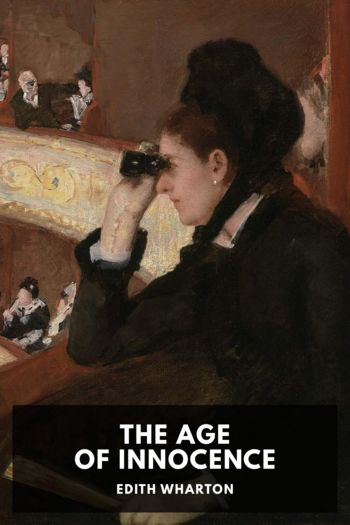The Age of Innocence, Edith Wharton [best 7 inch ereader txt] 📗

- Author: Edith Wharton
Book online «The Age of Innocence, Edith Wharton [best 7 inch ereader txt] 📗». Author Edith Wharton
When Archer walked down the sandy main street of St. Augustine to the house which had been pointed out to him as Mr. Welland’s, and saw May Welland standing under a magnolia with the sun in her hair, he wondered why he had waited so long to come.
Here was the truth, here was reality, here was the life that belonged to him; and he, who fancied himself so scornful of arbitrary restraints, had been afraid to break away from his desk because of what people might think of his stealing a holiday!
Her first exclamation was: “Newland—has anything happened?” and it occurred to him that it would have been more “feminine” if she had instantly read in his eyes why he had come. But when he answered: “Yes—I found I had to see you,” her happy blushes took the chill from her surprise, and he saw how easily he would be forgiven, and how soon even Mr. Letterblair’s mild disapproval would be smiled away by a tolerant family.
Early as it was, the main street was no place for any but formal greetings, and Archer longed to be alone with May, and to pour out all his tenderness and his impatience. It still lacked an hour to the late Welland breakfast-time, and instead of asking him to come in she proposed that they should walk out to an old orange-garden beyond the town. She had just been for a row on the river, and the sun that netted the little waves with gold seemed to have caught her in its meshes. Across the warm brown of her cheek her blown hair glittered like silver wire; and her eyes too looked lighter, almost pale in their youthful limpidity. As she walked beside Archer with her long swinging gait her face wore the vacant serenity of a young marble athlete.
To Archer’s strained nerves the vision was as soothing as the sight of the blue sky and the lazy river. They sat down on a bench under the orange-trees and he put his arm about her and kissed her. It was like drinking at a cold spring with the sun on it; but his pressure may have been more vehement than he had intended, for the blood rose to her face and she drew back as if he had startled her.
“What is it?” he asked, smiling; and she looked at him with surprise, and answered: “Nothing.”
A slight embarrassment fell on them, and her hand slipped out of his. It was the only time that he had kissed her on the lips except for their fugitive embrace in the Beaufort conservatory, and he saw that she was disturbed, and shaken out of her cool boyish composure.
“Tell me what you do all day,” he said, crossing his arms under his tilted-back head, and pushing his hat forward to screen the sun-dazzle. To let her talk about familiar and simple things was the easiest way of carrying on his own independent train of thought; and he sat listening to her simple chronicle of swimming, sailing and riding, varied by an occasional dance at the primitive inn when a man-of-war came in. A few pleasant people from Philadelphia and Baltimore were picknicking at the inn, and the Selfridge Merrys had come down for three weeks because Kate Merry had had bronchitis. They were planning to lay out a lawn tennis court on the sands; but no one but Kate and May had racquets, and most of the people had not even heard of the game.
All this kept her very busy, and she had not had time to do more than look at the little vellum book that Archer had sent her the week before (the Sonnets from the Portuguese); but she was learning by heart “How They Brought the Good News from Ghent to Aix,” because it was one of the first things he had ever read to her; and it amused her to be able to tell him that Kate Merry had never even heard of a poet called Robert Browning.
Presently she started up, exclaiming that they would be late for breakfast; and they hurried back to the tumble-down house with its pointless porch and unpruned hedge of plumbago and pink geraniums where the Wellands were installed for the winter. Mr. Welland’s sensitive domesticity shrank from the discomforts of the slovenly southern hotel, and at immense expense, and in face of almost insuperable difficulties, Mrs. Welland was obliged, year after year, to improvise an establishment partly made up of discontented New York servants and partly drawn from the local African supply.
“The doctors want my husband to feel that he is in his own home; otherwise he would be so wretched that the climate would not do him any good,” she explained, winter after winter, to the sympathising Philadelphians and Baltimoreans; and Mr. Welland, beaming across a breakfast table miraculously supplied with the most varied delicacies, was presently saying to Archer: “You see, my dear fellow, we camp—we literally camp. I tell my wife and May that I want to teach them how to rough it.”
Mr. and Mrs. Welland had been as much surprised as their daughter by the young man’s sudden arrival; but it had occurred to him to explain that he had felt himself on the verge of a nasty cold, and this seemed to Mr. Welland an all-sufficient reason for abandoning any





Comments (0)